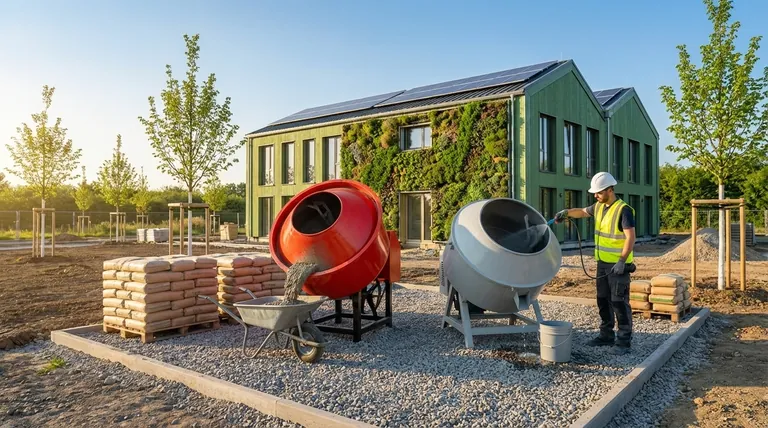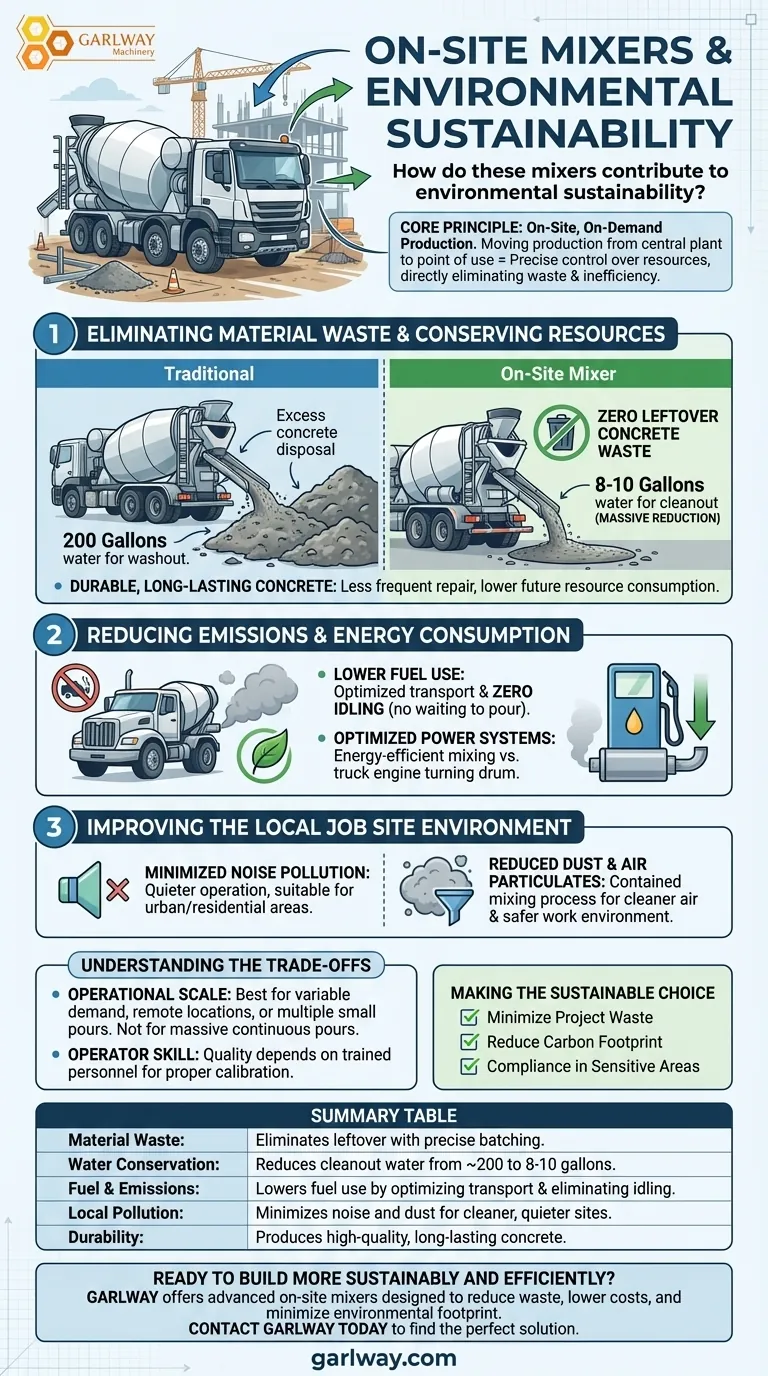At their core, these mixers contribute to environmental sustainability by fundamentally changing how concrete is produced and delivered. They operate on a "just-in-time" model at the job site, which drastically reduces material waste, conserves fuel and water, and minimizes local pollution like noise and dust.
The primary environmental benefit of these mixers stems from a single principle: moving production from a central plant to the actual point of use. This shift gives you precise control over resources, directly eliminating the waste, excess emissions, and inefficiencies inherent in traditional concrete delivery.

The Core Principle: On-Site, On-Demand Production
The most significant environmental advantages are a direct result of mixing materials exactly when and where they are needed. This contrasts sharply with conventional barrel trucks that are filled at a central plant.
Eliminating Material Waste
Traditional methods require ordering a full truckload, often leading to excess concrete that must be disposed of. On-site mixers carry unmixed materials (sand, cement, water, stone) and produce the exact volume required for the job.
This precise batching means there is virtually no leftover concrete waste.
Conserving Water Resources
The difference in water usage is stark. A conventional barrel truck can require up to 200 gallons of water for a full washout after a delivery.
An on-site mixer, by contrast, needs only 8-10 gallons for its cleanout process, representing a massive reduction in water consumption for every job.
Creating Durable, Long-Lasting Concrete
Precise, fresh mixing on-site often results in a higher quality, more durable final product. This long-term durability is a key aspect of sustainability.
Concrete that doesn't require frequent repair or replacement minimizes the resource consumption and environmental impact associated with future construction work.
Reducing Emissions and Energy Consumption
Moving away from the traditional model also has a direct impact on fuel use and the associated carbon footprint.
Lowering Fuel Use
Because materials are delivered in a single trip and mixed on-site, transportation needs are optimized. More importantly, it eliminates the need for the truck's engine to idle for long periods while waiting to pour.
This reduction in idling and transport directly translates to lower fuel consumption and fewer emissions.
Optimizing Power Systems
Modern mobile mixers are engineered with efficient power and mixing systems designed for their specific task. This is more energy-efficient than using a large truck engine, designed for transport, to continuously turn a heavy drum of wet concrete.
Improving the Local Job Site Environment
The benefits extend beyond resource conservation to the immediate area surrounding a construction project.
Minimizing Noise Pollution
On-site mixers generally operate more quietly and only when actively producing concrete, unlike the constant noise from a traditional mixer truck. This significantly reduces noise pollution, a critical factor in urban or residential areas.
Reducing Dust and Air Particulates
The contained mixing process helps to control the release of cement dust and other particulates into the air. This improves local air quality and contributes to a safer, cleaner work environment.
Understanding the Trade-offs
While highly beneficial, this method is not a universal solution. Understanding its context is key to making an informed decision.
Operational Scale
For massive, continuous pours where a steady, high-volume supply is needed, a dedicated batch plant and a fleet of traditional trucks might still be the most efficient logistic choice. These on-site mixers excel in projects with variable demand, multiple small pours, or remote locations.
Operator Skill
The quality of the final product from a mobile mixer depends heavily on the skill of the operator. Proper calibration and operation are essential to ensure the concrete meets specifications, which requires well-trained personnel.
Making the Sustainable Choice for Your Project
Your specific project goals will determine how you can best leverage the environmental benefits of on-site mixing.
- If your primary focus is minimizing project waste: The ability to pour the exact amount needed makes this the most effective method for eliminating material waste and associated disposal costs.
- If your primary focus is reducing your carbon footprint: The significant reduction in fuel consumption from optimized transport and zero idling offers a clear path to lower emissions.
- If your primary focus is compliance in sensitive areas: The lower noise and dust levels provide a distinct advantage for projects in urban, residential, or environmentally protected zones.
By placing resource control directly at the job site, these mixers empower you to build more efficiently and with a significantly smaller environmental footprint.
Summary Table:
| Sustainability Benefit | Key Impact |
|---|---|
| Material Waste | Eliminates leftover concrete with precise on-site batching |
| Water Conservation | Reduces cleanout water from ~200 gallons to just 8-10 gallons |
| Fuel & Emissions | Lowers fuel use by optimizing transport and eliminating truck idling |
| Local Pollution | Minimizes noise and dust for cleaner, quieter job sites |
| Durability | Produces high-quality, long-lasting concrete, reducing future resource needs |
Ready to build more sustainably and efficiently?
GARLWAY specializes in construction machinery, offering advanced concrete mixers and batching plants that deliver these exact environmental and operational benefits. Our on-site mixers are designed for construction companies and contractors globally who want to reduce waste, lower costs, and minimize their environmental footprint.
Contact GARLWAY today to find the perfect mixer solution for your project's sustainability goals and see how we can help you conserve resources while improving productivity.
Visual Guide

Related Products
- Commercial Construction Mixer Machine for Soil Cement Mixing Concrete
- HZS75 Concrete Batching Plant Cement Mixer Price Concrete Mixer Bunnings Mixing Plant
- HZS180 Ready Mix Concrete Plant for Foundations with Sand and Cement
- Hydraulic Concrete Mixer Machine Cement Mixing Equipment for Mixture Concrete
- Construction Products Concrete Plant Machine Mixing Concrete Mixer
People Also Ask
- What is the correct order for loading materials into a concrete mixer? Achieve a Perfect Homogeneous Mix
- Why is the choice of manufacturer important when purchasing a self loading mixer truck? Ensure Project Success & Long-Term Value
- What are the structural styles of forced mixers? A Guide to Planetary, Single, and Twin-Shaft Designs
- What specifications are typically listed for drum concrete mixers? Select the Right Mixer for Your Construction Needs
- What are the disadvantages of concrete mixers? Hidden Costs & Quality Risks Revealed
- What is the importance of cleaning and lubricating a self-loading concrete mixer? Boost Lifespan & Prevent Costly Downtime
- What is the general approach to troubleshooting concrete mixer faults? A 4-Step Guide to Minimize Downtime
- What is the role of the rotational mechanism in a cement mixer? The Key to Uniform, Strong Concrete



















